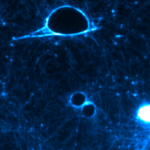About
CNF1 is a toxin that catalyzes the permanent activation of host RhoA, Rac1 and Cdc42 small GTPases by selective deamidation of a glutamine residue into a glutamic acid. This 1 dalton post-translational modification can be viewed as a “somatic missense-mutation” that promotes a permanent activation of Rho GTPases. Interestingly, we showed that eukaryotes have evolved a selective system that protects cells from the over-activation of Rho GTPases and notably in response to CNF1 action. This involves the targeting of activated Rho proteins to the ubiquitin-mediated proteasomal degradative system, as a function of their strength of activation. Study of CNF1 has been instrumental in deciphering critical E3 ligases responsible for the ubiquitination of Rho GTPases, thereby opening new avenues of research on this unexplored regulation.
We use cellular microbiology approaches combined with biophysics to understand how bacteria producing CNF1 hijack the host cytoskeleton and adhesive structures to build up efficient invasion mechanism.







